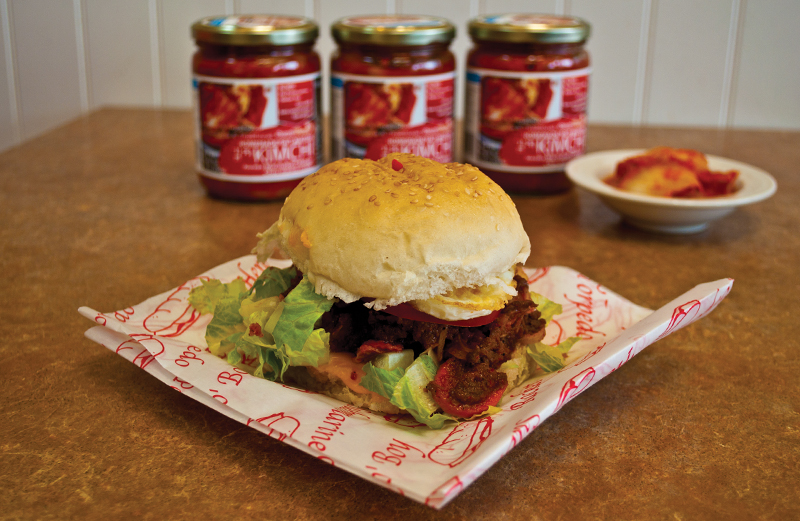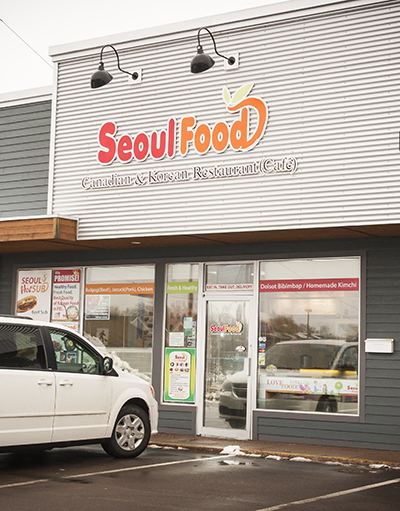Charlottetown restaurant enters retail market with staple of Korean cuisine
When someone mentions homemade Island food products, images of sweetly bottled preserves, fresh potato bread or lobster pate probably spring to mind. Kimchi, on the other hand, seems an unlikely image to pair with the Island’s traditional cuisine. And yet, this staple of the Korean diet is the one of the latest Island products to hit the big time – the grocery retail market. Behind this inspired success story is Korean-born Steven Han, owner and operator of Charlottetown’s Seoul Food restaurant.
“We began to sell the kimchi out of our restaurant for customers to take home, because there were a lot of requests,” he said. “We wanted to allow as many people as possible to enjoy this unique experience of kimchi. . . the best way to accomplish this goal was to dive into the retail market.”
Han and his family moved to the Island from South Korea in March of 2009, drawn by the Island’s natural beauty, its people, and the peaceful atmosphere they’d enjoyed while on previous vacations. As the family settled into life on the Island, they marvelled at the diversity of culture and decided they wanted to contribute to it through the deepest bond of commonality humans can share – food.
“Bringing people together through food and culture can be a powerful way to create awesome community, and so we established our restaurant, Seoul Food,” Han said.
Seoul Food quickly developed a large and loyal Asian customer base that appreciated their traditional Korean dishes such as bulgogi, bibimbap, and gamjatang. It also found favour with many Islanders and tourists and Han began to fuse some of the Korean menu items with Western-style foods, such as sub sandwiches that feature bulgogi (beef) and jaeuck (pork). The common thread throughout their menu, however, has always been their homemade kimchi.

Photo Credit: Laura Weatherbie/Salty
“Kimchi is served as a side dish with every meal,” Han said. “It also makes up some of the main dishes for those looking for its special taste.” He added that the Korean staple is considered amongst the healthiest of foods because it contains probiotics (healthy bacteria) that help improve digestion and prevent the spread of unhealthy gut bacteria.
A traditional, fermented food, kimchi is typically prepared by dicing Napa cabbage, soaking it in salt water, then mixing it with other vegetables such as carrot and a sauce that includes red pepper paste, garlic, ginger, and other seasonings. The final step involves setting the mixture out at room temperature until it has fermented (usually this takes a couple of days). Kimchi’s closest cousin in Western cuisine would be sauerkraut, though by comparison sauerkraut is sorely lacking in spiciness.
“The sauce is what makes the kimchi unique,” Han said. Seoul Food’s recipe originates from Han’s mother-in-law, who inherited it from her parents. The use of fresh, naturally-grown ingredients is also very important, said Han.
As demand for Seoul Food’s kimchi grew at their restaurant location on University Avenue, Han began researching opportunities to bring the kimchi into the retail market before approaching one of the most well-established grocery retailers in the country.

Photo Credit: Laura Weatherbie/Salty
“We carefully considered all of the options and Atlantic Sobeys caught our attention,” he said. He was impressed by Sobeys’ commitment to showcasing local products and the positive shopping experiences his family had enjoyed at the grocery retailer. “Sobeys has been such an amazing partner and help. [We] both knew that is would become a popular item in the retail market. Samples of the product were given and were well received.”
Scaling up from restaurant production to retail production has involved a lot of legwork – from finding different means of accessing ingredients to developing packaging and ensuring label and food safety requirements were met.
“We have received an enormous amount of support in bringing Seoul Food Kimchi to the retail market, especially from the amazing people at Sobeys and the production team at PEI’s BioFoodTech,” Han said.
All of the family’s hard work has paid off, with Sobeys stores across Atlantic Canada stocking the kimchi and customers from all over the region asking for more. “We are so fortunate and grateful for such a positive response,”said Han, who is already setting his sights on expanding distribution of Seoul Food Kimchi in the retail market and potentially to other restaurants.
- TO SEE OR NOT TO SEE - March 31, 2018
- Constructing a Food Island - January 1, 2018
- Never a Dull Moment - December 1, 2017
- Accessorize Your Cutlery - December 1, 2017
- A Salty Christmas Shopping Guide - December 1, 2017
- Whatever Floats Your Goat - November 1, 2017
- Spirited Endeavours - November 1, 2017
- A Win-Win - November 1, 2017
- Planting the Seeds for Food Literacy - November 1, 2017
- Let’s Talk Food - November 1, 2017


